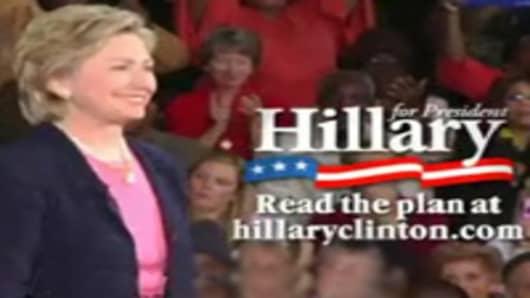The numbers are in and it was a rich third quarter for candidates--Hillary Clinton's campaign raised $27 million in the third quarter, beating Barack Obama, whose campaign raised about $20 million over the same time period. With those two in the lead, John Edwards raised just $7 million, and Bill Richardson about $5 million in the third quarter.
The Democrats are far ahead of the Republicans. So far Mitt Romney has raised some $35 million all year, with Giuiliani at about $34 million year-to-date. With a late start and making gains, TV star/former Senator, Fred Thompson raised about $8 million in the past quarter, John McCain raising $5 million.
All this money means that this coming year more money will be spent on political advertising than ever. Over the past few decades, political ad spending has at least doubled every four years, from $700 million in 2000, to $1.7 billion in 2004. This is expected to be a record-setting cycle in 2008--ads expected to hit between $2.5 and $3 billion. With campaigns starting earlier than ever, new campaign finance rules, and a tighter primary schedule, money is flooding the market. Nearly $20 million of TV air time has already been purchased--mostly in New Hampshire and Iowa.
So who benefits? The fact that political ad spending is bucking general advertising trends is good news for the TV networks, particularly those media companies with the most affiliate stations. That means CBS and News Corp'sFox--both hit the limit of the number of local stations they can own. And these ad revenues will help CBS stock more than News Corp, simply because the TV stations are a bigger pat of CBS Corp's business.
But will it move the needle? It's certainly not a game changer for these companies in light of the general flattening and decline of local ad spending in general. But, the good news is that this increase does help offset that decline.
What about internet ads? The candidates are spending remarkably little on them--it doesn't communicate a mass message the way a TV ad does. But they are doing everything they can to build an online presence--profiles on social networking sites, Web sites, even ringtones. But lucky for the candidates, that stuff is cheap, or even free.
Estimated political and issue TV ad spending (year and amount):
2000 $700 million
2002 $980 million
2004 $1.7 Billion
2006 $2.3 Billion
Source: TNS Media Intelligence, Campaign Media Analysis
And don't miss the CNBC/MSNBS/Wall Street Journal sponsored debate of the GOP candidates running for president. That's live from Dearborn, Michigan on Tuesday, October 9th, from 4p EST to 6p EST. CNBC political reporter John Harwood is one of the panelists.
Questions? Comments? MediaMoney@cnbc.com



